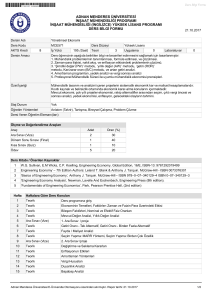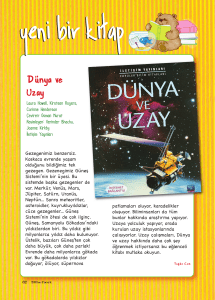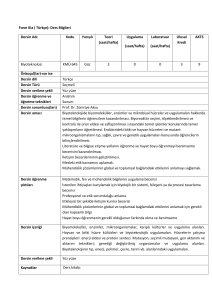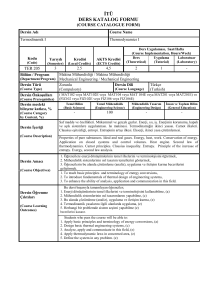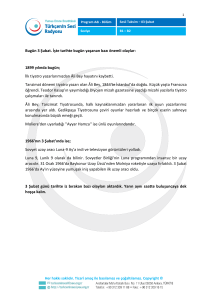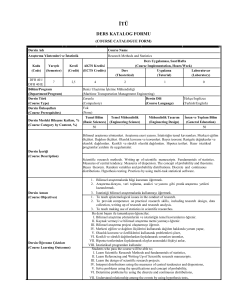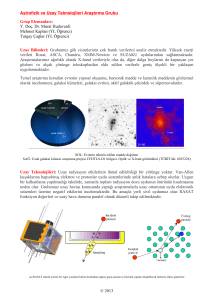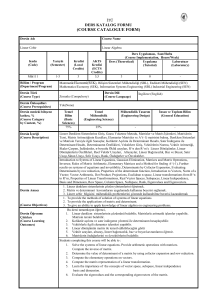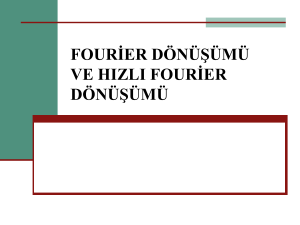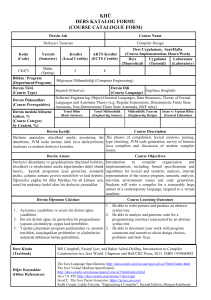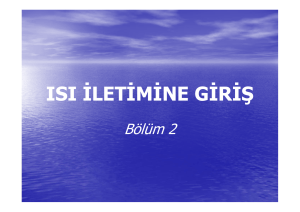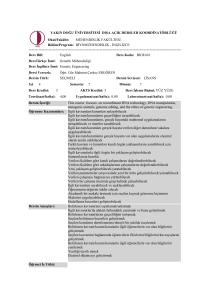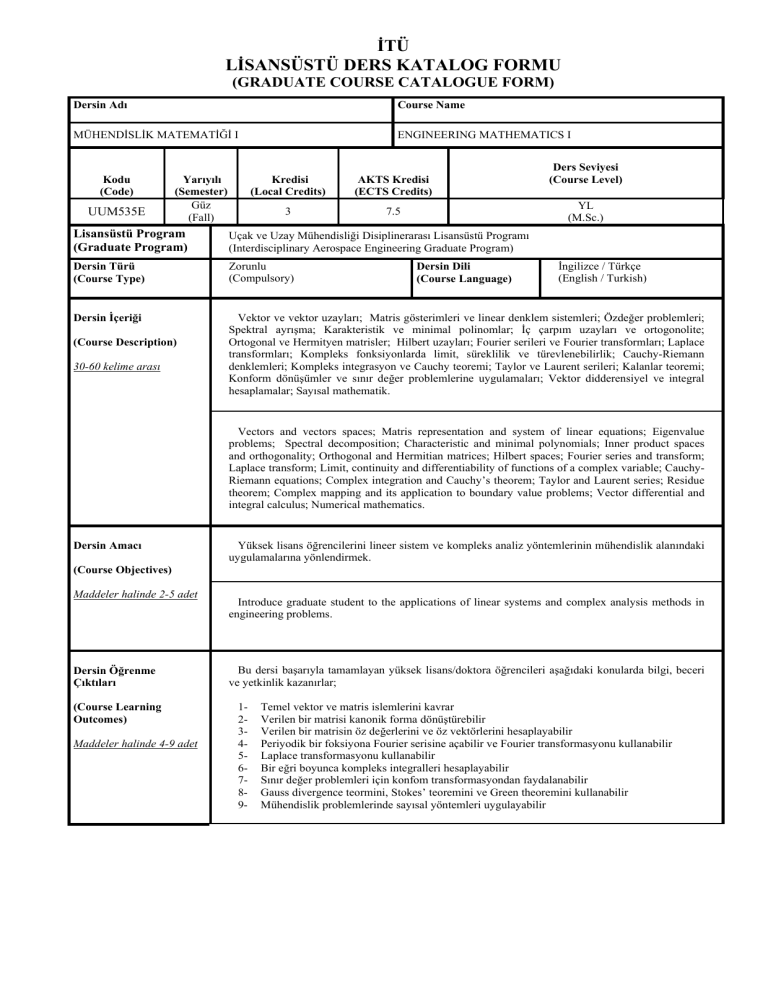
İTÜ
LİSANSÜSTÜ DERS KATALOG FORMU
(GRADUATE COURSE CATALOGUE FORM)
Dersin Adı
Course Name
MÜHENDİSLİK MATEMATİĞİ I
ENGINEERING MATHEMATICS I
Kodu
(Code)
UUM535E
Yarıyılı
(Semester)
Güz
(Fall)
Kredisi
(Local Credits)
AKTS Kredisi
(ECTS Credits)
3
7.5
Ders Seviyesi
(Course Level)
YL
(M.Sc.)
Lisansüstü Program
(Graduate Program)
Uçak ve Uzay Mühendisliği Disiplinerarası Lisansüstü Programı
(Interdisciplinary Aerospace Engineering Graduate Program)
Dersin Türü
(Course Type)
Zorunlu
(Compulsory)
Dersin İçeriği
Vektor ve vektor uzayları; Matris gösterimleri ve linear denklem sistemleri; Özdeğer problemleri;
Spektral ayrışma; Karakteristik ve minimal polinomlar; İç çarpım uzayları ve ortogonolite;
Ortogonal ve Hermityen matrisler; Hilbert uzayları; Fourier serileri ve Fourier transformları; Laplace
transformları; Kompleks fonksiyonlarda limit, süreklilik ve türevlenebilirlik; Cauchy-Riemann
denklemleri; Kompleks integrasyon ve Cauchy teoremi; Taylor ve Laurent serileri; Kalanlar teoremi;
Konform dönüşümler ve sınır değer problemlerine uygulamaları; Vektor didderensiyel ve integral
hesaplamalar; Sayısal mathematik.
(Course Description)
30-60 kelime arası
Dersin Dili
(Course Language)
İngilizce / Türkçe
(English / Turkish)
Vectors and vectors spaces; Matris representation and system of linear equations; Eigenvalue
problems; Spectral decomposition; Characteristic and minimal polynomials; Inner product spaces
and orthogonality; Orthogonal and Hermitian matrices; Hilbert spaces; Fourier series and transform;
Laplace transform; Limit, continuity and differentiability of functions of a complex variable; CauchyRiemann equations; Complex integration and Cauchy’s theorem; Taylor and Laurent series; Residue
theorem; Complex mapping and its application to boundary value problems; Vector differential and
integral calculus; Numerical mathematics.
Dersin Amacı
Yüksek lisans öğrencilerini lineer sistem ve kompleks analiz yöntemlerinin mühendislik alanındaki
uygulamalarına yönlendirmek.
(Course Objectives)
Maddeler halinde 2-5 adet
Dersin Öğrenme
Çıktıları
(Course Learning
Outcomes)
Maddeler halinde 4-9 adet
Introduce graduate student to the applications of linear systems and complex analysis methods in
engineering problems.
Bu dersi başarıyla tamamlayan yüksek lisans/doktora öğrencileri aşağıdaki konularda bilgi, beceri
ve yetkinlik kazanırlar;
123456789-
Temel vektor ve matris islemlerini kavrar
Verilen bir matrisi kanonik forma dönüştürebilir
Verilen bir matrisin öz değerlerini ve öz vektörlerini hesaplayabilir
Periyodik bir foksiyona Fourier serisine açabilir ve Fourier transformasyonu kullanabilir
Laplace transformasyonu kullanabilir
Bir eğri boyunca kompleks integralleri hesaplayabilir
Sınır değer problemleri için konfom transformasyondan faydalanabilir
Gauss divergence teormini, Stokes’ teoremini ve Green theoremini kullanabilir
Mühendislik problemlerinde sayısal yöntemleri uygulayabilir
M.Sc./Ph.D. students who successfully pass this course gain knowledge, skill and competency in
the following subjects;
123456789-
Able use basic vector and matrix operations
Able to reduce a matrix into a row-reduced echelon form
Able to compute eigenvalues and eigenvectors of a matrix
Able to apply Fourier transform to a periodic function and use Fourier transform
Able to use Laplace transform
Able to compute complex line integrals
Able to use complex mapping for some boundary value problems
Able to use Gauss divergence theorem, Stokes’ theorem, Green theorem
Able to apply numerical methods for engineering problems
Kaynaklar
12-
(References)
3-
Jeffrey, A., 2002. Advanced Engineering Mathematics. Harcourt/Academic Press.
Brockett, R.W., 1970. Finite Dimensional Linear Systems. Wiley.
Silverman, R.A., 1972. Introductory Complex Analysis. Dover.
En önemli 5 adedini belirtiniz
Ödevler ve Projeler
Üç ödev
(Homework & Projects)
Three homeworks
Laboratuar Uygulamaları
Yok
(Laboratory Work)
None
Bilgisayar Kullanımı
Düşük seviyede bilgisayar becerisi
(Computer Use)
Low level computer skills
Diğer Uygulamalar
Yok
(Other Activities)
None
Başarı Değerlendirme
Sistemi
(Assessment Criteria)
Faaliyetler
(Activities)
Yıl İçi Sınavları
(Midterm Exams)
Kısa Sınavlar
(Quizzes)
Ödevler
(Homework)
Projeler
(Projects)
Dönem Ödevi/Projesi
(Term Paper/Project)
Laboratuar Uygulaması
(Laboratory Work)
Diğer Uygulamalar
(Other Activities)
Final Sınavı
(Final Exam)
Adedi*
(Quantity)
Değerlendirmedeki Katkısı, %
(Effects on Grading, %)
1
35
3
15
1
*Yukarıda Belirtilen Sayılar Minimum Olup Yerine Getirilmesi Zorunludur.
50
DERS PLANI
Hafta
1
2
3
4
5
6
7
8
9
10
11
12
13
14
Konular
Vektör ve vektör uzayları
Matrisler ve lineer denklem sistemleri
Özdeğerler, özvektörler ve köşegenleştirme
Karakteristik ve minimal polinomlar
İç çarpım uzayları ve ortogonolite. Hilbert uzayları
Fourier serileri, Fourier integralleri ve Fourier dönüşümleri
Laplace dönüşümü
Kompleks fonksiyonlarda limit, süreklilik ve türevlenebilirlik
Cauchy-Riemann denklemleri
Kompleks integrasyon ve Cauchy teoremi
Taylor ve Laurent serileri. Kalanlar teoremi
Konform dönüşümler ve sınır değer problemlerine uygulanması
Vektor diferansiyel and integral hesaplamaları
Sayısal matematik
Dersin
Çıktıları
1
2
3
3
1
4
5
6
6,7
6
6
7
8
9
COURSE PLAN
Weeks
1
2
3
4
5
6
7
8
9
10
11
12
13
14
Topics
Vector and vector spaces
Matrices and system of linear eqautions
Eigenvalues, eigenvectors and diagonalization
Characteristic and minimal polynomials
Inner product spaces and orthogonality. Hilbert spaces
Fourier series, Fourier integrals and the Fourier transform
Laplace transform
Limit, continuity and differentiability of functions of a complex variable
Cauchy-Riemann equations
Complex integration and Cauchy’s theorem
Taylor and Laurent series. Residue theorem
Complex mapping and its applications to boundary value problems
Vector differential calculus and vector integral calculus
Numerical mathematics
Course
Outcomes
1
2
3
3
1
4
5
6
6,7
6
6
7
8
9
NOT-1: Ders planı, sadece hafta bazında işlenen ders konularını içermeli, ara ve
kısa sınavlar ders planlarına yazılmamalıdır.
Dersin Uçak ve Uzay Mühendisliği Programıyla İlişkisi
Programın mezuna kazandıracağı bilgi, beceri ve yetkinlikler (programa ait çıktılar)
i.
ii.
iii.
Lisans düzeyi yeterliliklerine dayanarak, Uçak ve Uzay Mühendisliği alanında bilgilerini uzmanlık düzeyinde
geliştirebilme ve derinleştirebilme, edindiği bilgi ve becerileri eleştirel bir yaklaşımla değerlendirebilme ve
öğrenmesini yönlendirebilme
Uçak ve Uzay Mühendisliği alanında edindiği kuramsal ve uygulamalı bilgileri kullanabilme yetkinliği
kazanma, Uçak ve Uzay Mühendisliği’nde karşılaşılan sorunları kavrama, analiz edebilme ve kuramsal, sayısal
ya da deneysel araştırma yöntemlerini kullanarak çözümleyebilme
Uçak ve Uzay Mühendisliğinin ilgili olduğu disiplinlerarası etkileşimi kavrayabilme, ürüne yönelik çalışmada
takım çalışmasının gereğinin ve öneminin bilincinde olarak, farklı disiplin alanlarından gelen bilgiyi
sentezleyebilme ve yeni bilgiler /yöntemler oluşturabilme ya da alanında özümsediği bilgiyi, problem çözme
ve/veya uygulama becerilerini, disiplinlerarası çalışmalarda kullanabilme
Katkı
Seviyesi
1
2
3
x
x
x
iv.
v.
vi.
vii.
viii.
ix.
Uçak ve Uzay Mühendisliği ile ilgili uzmanlık gerektiren bir çalışmayı bağımsız olarak yürütebilme,
uygulamalarda karşılaşılan ve öngörülemeyen karmaşık sorunların çözümü için yeni stratejik yaklaşımlar
geliştirebilme ve sorumluluk alarak çözüm üretebilme
Bir yabancı dili en az Avrupa Dil Portföyü B2 genel düzeyinde kullanarak sözlü ve yazılı iletişim kurabilme
Uçak ve Uzay Mühendisliği’ndeki güncel gelişmeleri ve kendi çalışmalarını, nicel ve nitel veriler ile
destekleyerek, ulusal ve uluslararası platformlarda, yazılı, sözlü ve görsel olarak sistemli biçimde aktarabilme
Uçak ve Uzay Mühendisliği ile ilgili verilerin toplanması, yorumlanması, uygulanması ve duyurulması
aşamalarında toplumsal, bilimsel, kültürel ve etik değerleri gözeterek denetleyebilme ve bu değerleri
öğretebilme
Uçak ve Uzay Mühendisliği’nin gerektirdiği düzeyde bilgisayar yazılımı ve programlama dilleri ile birlikte
bilişim ve iletişim teknolojilerini ileri düzeyde kullanabilme
Uçak ve Uzay Mühendisliği ile ilgili sorunların çözümlenmesini gerektiren ortamlarda liderlik yapabilme; sosyal
ilişkileri ve bu ilişkileri yönlendiren normları eleştirel bir bakış açısı ile inceleyebilme, geliştirebilme ve
gerektiğinde değiştirmek üzere harekete geçebilme; strateji, politika ve uygulama planları geliştirebilme ve elde
edilen sonuçları, kalite süreçleri çerçevesinde değerlendirebilme
x
x
x
x
x
1: Az, 2. Kısmi, 3. Tam
Relationship between the Course and Aerospace Engineering Program
Level of
Contribution
1
2
3
Program Outcomes
i.
ii.
iii.
iv.
v.
vi.
vii.
viii.
ix.
Developing and intensifying knowledge in the Aerospace Engineering area, based upon the competency in the
undergraduate level; assessing the specialistic knowledge and skill gained through the study with a critical view
and directing his/her own learning process.
The ability to use the expert-level theoretical and practical knowledge acquired in the Aerospace Engineering
area; understanding , analyzing and solving the problems faced in the Aerospace Engineering by making use of
the theoretical, numerical and experimental research methods.
Grasping the inter-disciplinary interaction related to Aerospace Engineering area; being conscious of importance
and necessity of team work in a product oriented study, interpreting and forming new types of knowledge by
combining the knowledge from the area and the knowledge from various other disciplines or using the
knowledge and the skills for problem solving and/or application (which are processed within the area) in interdisciplinary studies.
The ability to carry out a specialistic study related to Aerospace Engineering area independently; developing
new strategic approaches to solve the unforeseen and complex problems arising in the practical processes of
Aerospace Engineering area and coming up with solutions while taking responsibility.
Having proficiency in a foreign language and establishing written and oral communication with that language
Systematically transferring the current developments in the Aerospace Engineering and his/her own work
within the national and international environments orally, visually and in written forms.
Paying regard to social, scientific, cultural and ethical values during the collecting, interpreting, practicing and
announcing processes of the area related data and the ability to teach these values to others.
Using the programming languages and computer software together with the information and communication
technologies efficiently and according to the needs of the Aerospace Engineering.
Fulfilling the leader role in the environments where solutions are sought for the problems related to the
Aerospace Engineering; Ability to see and develop social relationships and the norms directing these
relationships with a critical look and the ability to take action to change these when necessary; developing
strategy, policy and application plans concerning the subjects related to the Aerospace Engineering and the
ability to evaluate the end results of these plans within the frame of quality.
1: Little, 2. Partial, 3. Full
NOT-2: Ders ile ilgisi olmayan çıktıların boş bırakılması gerekmektedir.
Düzenleyen (Prepared by)
Tarih (Date)
Doç. Dr. Mehmet ŞAHİN
03.09.2011
İmza (Signature)
x
x
x
x
x
x
x
x

